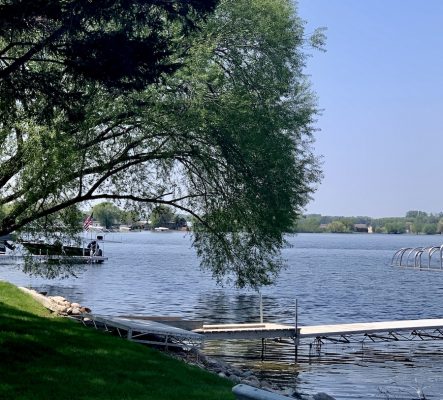Brad and Leanne Donnay and family, parishioners at Holy Cross in Pearl Lake/Marty, operate a 10-acre dairy farm in Kimball, which uses sustainable farming practices and avoids products that contain genetically-modified organisms (GMOs) and chemicals. Their 160 goats eat locally-sourced feed when possible and also have access to pasture.

The Donnays are supporters of “Upstream, Loving Where We Live,” an initiative that seeks to make a change by amplifying Minnesotans’ shared connections to place with a spirit of optimism.
“Caring for the land is important to us, as is sharing our story with others,” Brad said. “I’m not trying to showcase Donnay Dairy like an advertisement, but we’re doing things that might inspire others to be good stewards for Minnesota’s land. Upstream is a new way to share our story — it brings people together from every aspect of life.”
Upstream is dedicated to celebrating and amplifying the ways Minnesotans from all backgrounds care for the places where they live while inspiring new actions to be even better stewards of the state.
“Upstream is a love letter to Minnesota’s natural places, ensuring that those spaces are healthy and here for generations to come,” said Andy Goldman-Gray, Upstream’s initiative director. “Upstream shines a light on people who put energy, time and effort into making Minnesota a special place to live. … Every single Minnesotan connects to our place — we all drink the same water, breathe the same air, appreciate the lakes, parks and open spaces.
“When you focus on something that’s of value — our places — and a shared value — caring for our places — we can see the best in each other and create strong relationships across our differences,” Andy said.
Upstream was formed by a diverse group of people — from both sides of the political aisle, rural and urban, people of color, a variety of ages, ethnic backgrounds, religious groups — who care deeply for the natural places that are our home.
“At Upstream we wanted to develop better relationships between people who may look or think differently. And we wanted to reframe a new approach to get people engaged to change our culture,” Andy said.
“The old way — some unknown person or organization telling us what we should or shouldn’t do for the environment — hasn’t worked. It’s led to division and resentment. Instead, Upstream is focused on lifting up local stories of people making a difference in our natural world as a way to inspire all Minnesotans to come together to care for our natural places.
“People see themselves as stewards of this place. And stewardship is something faith leaders understand — taking care of the gifts of creation we’ve been given. It’s our job to leave this place better than it was when we began,” Andy said.
In fact, he noted, the Minnesota Catholic Conference was the initiative’s first organizing partner.
MCC partnered with Upstream in its efforts “to help Minnesota Catholics become better stewards of God’s creation,” it said in a Facebook post last month about the initiative. “Upstream helps to cultivate a shared value of caring for our lands, lakes, parks, and streets that inspire even more people to act in ways, both large and small, to be better stewards of Minnesota’s unique and beautiful natural places.”
Upstream is facilitating hundreds of conversations of people who typically have not been invited into a discussion about how Minnesotans value and care for our places, he added. The hope is that people are inspired to work together to ensure that natural spaces are healthy and here for generations to come. Upstream will shine a light on those who make Minnesota a special place to live.

What actions might people or groups take?
Andy pointed to a church that installed a solar garden that uses renewable energy, reducing the financial burden. Another faith community sponsored a fair to provide information about electric vehicles. Individuals or families might plant pollinator gardens or buffer zones or reduce their chemical pesticides.
Upstream is eager for more individual and churches to join as partner organizations, to share the values of optimism and love of Minnesota’s natural spaces that we have in common. To join, visit www.mnupstream.org and click on “Go Upstream.”
People seeing others loving Minnesota’s natural spaces can tag those activities on social media with #mnupstream when they see events or stories of artists, athletes, business leaders and others caring for our unique places.
It’s free to subscribe to Upstream’s monthly digest (www.mnupstream.org) for stories, practical tips about how to be better stewards and special offers and events.
“We know farmers who are doing an outstanding job in caring for the land,” Brad Donnay said. “Some plant cover crops, others use only organic feeds or fertilizers, or buy locally. Some might diversify their crop portfolio. Our children pick up garbage blown in the ditches. There are so many ways and each action can encourage and inspire others. Others recycle, or decide not to toss out their cigarette butts. If everybody does just their own little thing, all together we can do great things.”
In 2015, Pope Francis published the encyclical “Laudato Si,’ on Care for our Common Home.” Recently a seven-year action platform was introduced to widen the reach and address climate change. MCC also has a resource related to the encyclical titled “Minnesota, Our Common Home” (www.mncatholic.org/OurCommonHome).
“I like Upstream’s effort to showcase Minnesotans that go above and beyond taking care of God’s creation to make his world a better place. This initiative brings Laudato Si’ back in the forefront,” Brad said. “It inspires us to be better stewards in our own ways.”






















